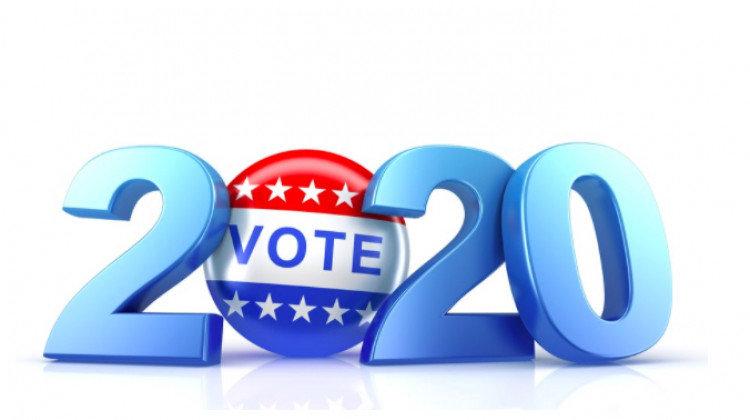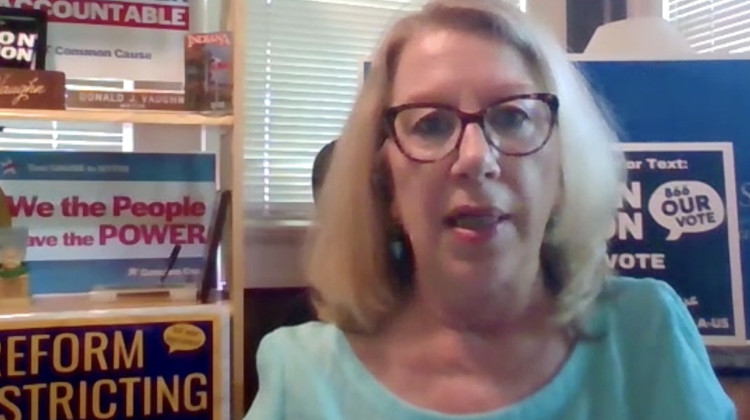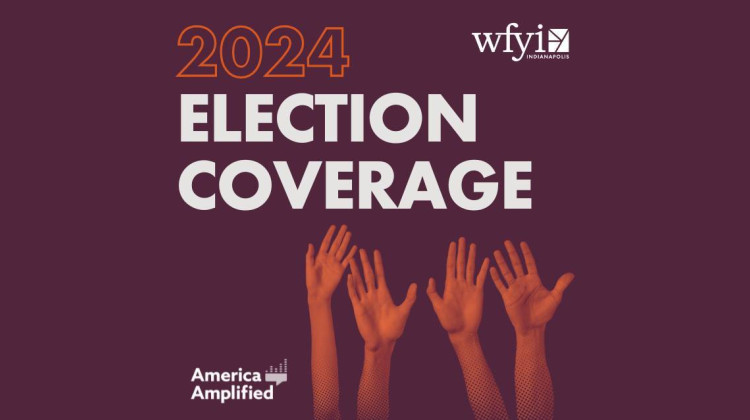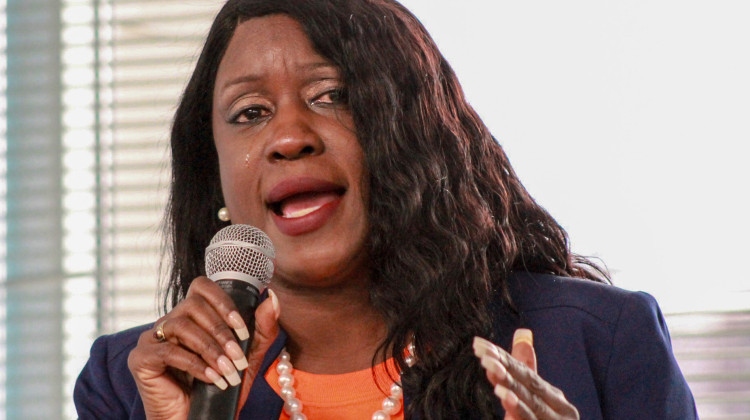America Amplified
From the presidency and Congressional representatives to governorship in 11 states, there’s a lot at stake in the November 3 election.
Because there has been a lot of confusing and often inaccurate information circulating, we thought it would be good to review some American election basics.
First, here’s what you need to know about voting in Indiana.
The Mechanics
To vote, you must be registered. Each state has different rules and deadlines, and the rules may change as we continue to assess the impact of the pandemic.
For voting information in Indiana, check the Indiana Voter Portal or Vote.org.
The deadline to register to vote for the November election is Oct. 5, 2020. Here's what you need to register to vote in Indiana:
- Have a valid Indiana Driver's License or Indiana State Identification Card.
- Be a citizen of the United States.
- Be at least 18 years old on or before the next general, municipal or special election. (A 17-year-old may register and vote in the primary election if the voter turns 18 on or before the next general or municipal election.)
- Have lived in your precinct for at least 30 days before the next general, municipal, or special election.
- Not currently imprisoned after being convicted of a crime.
Deadlines
The vote by mail application deadline is Oct. 22 at 11:59 p.m. (local prevailing time), and absentee ballots must be received by noon (local prevailing time) on Nov. 3.
Hoosier voters may cast their absentee ballots in person at the Clerk’s Office from Oct. 6 through noon (local prevailing time) on Nov. 2. Contact your County Election Administrator for an application. Be sure to bring a valid photo ID to absentee vote in-person.
If you wish to vote in-person, you can find your local polling locations through the Voter Portal.
Electoral College, Popular Vote Explainer
The nominees: The primary and caucus system chooses thousands of delegates who meet at national conventions to officially nominate their party’s presidential candidate.
Former Vice President Joe Biden is the Democratic nominee, emerging from the primary/caucus season with 2,627 delegates (1,990 are needed). Incumbent President Donald Trump has secured the Republican nomination with 2,376 out of 2,472 delegates.
With far fewer delegates, there are also candidates running as nominees of independent or third parties, including the Green Party, the Libertarian Party and the Birthday Party (candidate Kanye West).
Why the Electoral College?
The Electoral College is a system that traces its roots back to the founding of our nation and the legacy of white supremacy.
Many of the founding fathers mistrusted direct democracy (“the tyranny of the majority,” according to Alexis de Tocqueville) and wanted Congress to choose the President.
Creating this layer between the popular vote and the final election was a compromise. It would ensure, as Alexander Hamilton wrote in the Federalist Papers, that the “sense of the people” was preserved while the selection was in the hands of “men most capable of analyzing the qualities adapted to the station.”
Many historians also believe this “compromise” was reached to appease Southern slave owners by inflating Southern states’ population numbers with the “three-fifths” clause that counted slaves as three-fifths of a person. More people means more congressional representation.
It takes 270 electoral votes to win the Presidency. Each state has the same number of electoral votes as it has members of Congress -- one elector for each Congressperson, and one for each Senator. In addition, the District of Columbia has three electors. All states, except Maine and Nebraska, have a “winner-takes-all” policy in which all electoral votes are cast in that state for whomever wins the popular vote there. There are 538 electoral votes, with larger states having more electoral votes (California has 55, Alaska has three).
Popular Vote versus Electoral College Vote: There have been five times in U.S. history when a popular vote winner was not elected by the Electoral College -- most recently in 2000, when Al Gore narrowly won the popular vote but George W. Bush became president, and in 2016, when Donald Trump won the Electoral College while Hillary Clinton won the popular vote.
How can this happen?
States with smaller populations, Alaska for instance, have greater representation per capita in the Electoral College than populous states. If one candidate wins big in a number of populous states, they will likely win the popular vote. But if their opponent wins in a number of less populous states, he or she could win the Electoral College.
There has been a lot of political chatter about doing away with the Electoral College. Many believe it violates the one person-one vote mantra fundamental to American democracy. But doing so would mean states with less population would lose their electoral clout.,hanging the system would also require a Constitutional amendment -- a messy, politically fraught process.
The Voting Process (i.e. The 2020 Pandemic Election)
The pandemic has already impacted primary elections this year. Voting at the polls could mean exposure to the coronavirus; polling places have to adjust to take proper precautions.
There’s also been a push all over the country to expand vote-by-mail options. Five states -- Washington, Oregon, Colorado, Utah, and Hawaii -- automatically send registered voters a ballot.
This change is not without controversy -- including from Trump himself -- but bipartisanpolicy.org talked to three state and local election officials who say that vote-by-mail is not more subject to fraud than in-person voting.
Nearly all states already either allow mail-in voting options or have expanded those options and made them easier. Only five states (Indiana, Louisiana, Mississippi, Tennessee and Texas) provide in-person voting as the only option without a valid excuse for an absentee ballot. As of this writing, the coronavirus is NOT an accepted reason to request a mail-in or absentee ballot in those states.
READ MORE: Here Are The 11 Reasons You're Allowed To Vote By Mail In Indiana
Mail-in Ballot vs. Absentee Ballot: Traditionally, an absentee ballot is used to cast an absentee vote, usually by mail, by someone who can’t physically be present at a polling center on Election Day. In normal election years, that may be a college student who is living out-of-state, a member of the military or overseas voters.
A mail-in ballot is currently used in at least 34 states to some degree. Mail-in ballots are either requested by the voter, or, in eight states, automatically sent to all registered voters. (That is known as “universal vote-by-mail.”) The ballots are mailed back by the voter or deposited at a polling location by a certain time on or before election day. Absentee voting is one form of mail-in voting, but the terms are often used interchangeably.
Be Prepared For Anything
There are many different scenarios in 2020 that could cause a massive dysfunction in America’s democracy.
Millions are expected to vote-by-mail for the first time -- but as states are racing to update voting systems and expand mail-in vote options, few have procedures and technologies in place to ensure that millions of mail-in ballots can be received and counted. Georgia expanded mail-in ballots for its June primary, and the results were disastrous.
Many states will count mail-in ballots if they are postmarked on Election Day. That means vote tallying could last well beyond Nov. 3, sowing confusion and concern. Mail delays or late-mailed ballots may result in thousands of ballots being disqualified and votes not counted.
In-person polling places will still be available in most states, but there’s a dire shortage of poll workers nationwide.
Finally, there is concern that should Trump lose, he will not concede the election, leading to drawn-out fights in the courts.
 DONATE
DONATE









 View More Programs
View More Programs

 Support WFYI. We can't do it without you.
Support WFYI. We can't do it without you.